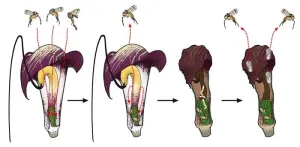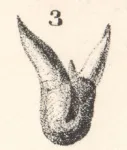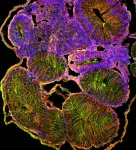(Press-News.org)
In the largest genome-wide association study to date on Type 2 diabetes, a team of international researchers, co-led by a University of Massachusetts Amherst genetic epidemiologist, has located 1,289 genetic markers associated with Type 2 diabetes (145 of which are newly identified) and generated risk scores for diabetes complications.
In research published Monday, Feb. 19 in the journal Nature that advances understanding into the inheritability of Type 2 diabetes, the scientists used cutting-edge computational approaches to identify eight distinct mechanistic clusters of genetic variants linked to the disease. They also discovered associations between individual clusters and diabetes complications.
“We tried to figure out some of the mechanisms for how these genetic variants are working – and we did,” says co-senior author Cassandra Spracklen, assistant professor of biostatistics and epidemiology in the School of Public Health and Health Sciences.
Ultimately, the goal is to identify potential genetic targets to treat or even cure the chronic metabolic disease that affects and sometimes debilitates more than 400 million adults worldwide, according to the International Diabetes Federation.
The study – emerging from the newly formed Type 2 Diabetes Global Genomics Initiative – included data from a highly diverse group of more than 2.5 million individuals, 428,452 of whom have Type 2 diabetes.
“We found eight clusters of Type 2 diabetes-associated variants that have also been associated with other diabetes risk factors – such as obesity and liver-lipid metabolism – suggesting the mechanisms for how the variants may be acting to cause diabetes,” Spracklen says. “Then we asked if these clusters were also associated with Type 2 diabetes complications? And we found that several of them to also associated with vascular complications, such as coronary artery disease and end-stage diabetic nephropathy.”
Even though effective treatments are available for Type 2 diabetes, the option for precision medicine tailored to the individual is still limited. For many people with the disease, treatment strategies still rely on trial and error. Being better able to understand the disease mechanisms will help predict individuals’ risk of Type 2 diabetes and allow for earlier intervention.
“We’re trying to understand how diabetes develops,” says Spracklen, adding that the new research includes data from cohorts not available in an earlier genome-wide association study published in 2022 in Nature Genetics, for which Spracklen was co-first author. “And we’re trying to better understand how these genetic variants are actually working within a biological tissue or at the cellular level, which can ultimately lead to new drug targets and treatments.”
Senior corresponding author Eleftheria Zeggini, director of the Institute of Translational Genomics at Helmholtz Munich and a professor at the Technical University of Munich, notes that collaboration among scientists is essential for evaluating vast patient data and achieving a comprehensive understanding of genomic risk variants.
“The genetic information in our cells harbors secrets about the risks, progression and complications of many diseases,” she says. “Our work leads to an improved understanding of disease-causing biological mechanisms. Better knowledge of progression risk for Type 2 diabetes complications can help put in place early interventions to delay or even prevent these debilitating medical conditions.”
The paper concludes, “Our findings … may offer a route to optimize global access to genetically informed diabetes care.”
END
Dopamine, a chemical messenger in the brain, is mostly known for its role in how we experience pleasure and reward. However, new research from the Champalimaud Foundation (CF) shifts the spotlight towards dopamine’s critical involvement in movement, with implications for our understanding and treatment of symptoms in Parkinson’s Disease (PD).
Imagine the act of walking. It’s something most able-bodied people do without a second thought. Yet it is actually a complex process involving various ...
In a group of plants that is famous for luring its pollinators into a death trap, one species offers its flowers as a nursery in exchange. The Kobe University discovery blurs the line between mutualism and parasitism and sheds light on the evolution of complex plant-insect interactions.
Many plants rely on animals for pollination and most offer rewards for the service. Some plants, however, deceive their pollinators, and a famous example is the genus Arisaema. “It is famous as the only plant that achieves pollination at the expense of the pollinator's life,” says Kobe University biologist SUETSUGU Kenji, who is an expert on plant pollination ecology. The plant uses ...
The prospect of the worrisome triple threat of COVID, RSV and flu was assuaged last year by the effectiveness of flu vaccines. Two recent studies from the Centers for Disease Control and Prevention’s VISION Network have found that flu vaccines were effective for all ages against both moderate and severe flu in the U.S. during the 2022-2023 flu season.
Both the pediatric and adult VISION Network studies analyzed flu-associated emergency department (E.D.)/urgent care visits (indicative of moderate disease) and hospitalization (indicative of severe disease) from October 2022 through March 2023, a flu season in which far fewer individuals were social distancing or ...
February 16, 2024
Contact: Nick Wilson
805-235-8008; nwilso28@calpoly.edu
Second Year of Cal Poly Astronomy Fellowship to Examine High-Energy Particle Jets Near Supermassive Black Holes
SAN LUIS OBISPO — In the second year of the Astronomy Faculty Research Fellowship in Cal Poly’s Bailey College of Science and Mathematics, a research team will study extremely high-energy photons emitted by the extreme environment found near mega-sized black holes.
The fellowship was ...
Language skills are strong predictors of academic, socioemotional and behavioral outcomes when children enter school. They learn language in preschool years by interacting with others, especially their parents. Book sharing is a popular way parents engage young children in conversation. However, not all parents are comfortable with book sharing and not all children like having books read to them.
A new study on “parent talk” by Florida Atlantic University, in collaboration with Aarhus University in Denmark, provides ...
Lincoln, Nebraska, Feb. 19, 2024 — A Husker research duo was named a first-round winner in a National Institutes of Health competition aimed at generating solutions for delivering genome-editing technology to the cells of people with rare and common diseases.
Janos Zempleni, Willa Cather Professor of molecular nutrition, and Jiantao Guo, professor of chemistry, were selected as Phase 1 winners in the NIH’s Targeted Genome Editor Delivery Challenge. The challenge is a three-phase competition with prizes totaling $6 million; the University of Nebraska–Lincoln team was among 30 initial recipients announced in December ...
COLUMBUS, Ohio – Until recently, Orthacanthus gracilis could have been considered the “John Smith” of prehistoric shark names, given how common it was.
Three different species of sharks from the late Paleozoic Era – about 310 million years ago – were mistakenly given that same name, causing lots of grief to paleontologists who studied and wrote about the sharks through the years and had trouble keeping them apart.
But now Loren Babcock, a professor of earth sciences at The Ohio State University, has finished the arduous task of renaming two of the three sharks – and in the process rediscovered a wealth ...
A rapid scoping review has been conducted which reveals five common ways in which the health of homeless pet owners and their companion animals is improved.
Ten percent of homeless people keep pets. But little information exists on specific intervention strategies for improving the health of homeless people and their pets who are often the only source of unconditional love or companionship in their life.
The study, published in the Human-Animal Interactions journal, found that the most common ways ...
Potassium deficiency in agricultural soils is a largely unrecognised but potentially significant threat to global food security if left unaddressed, finds new research involving researchers at UCL, University of Edinburgh and the UK Centre for Ecology & Hydrology.
The study, published in Nature Food, found that more potassium is being removed from agricultural soils than is being added, throughout many regions of the world. It also gives a series of recommendations for how to mitigate the issue.
Potassium is a vital nutrient for plant growth that ...
How does our intestine, which can be at least 15 feet long, fit properly inside our bodies? As our digestive system grows, the gut tube goes through a series of dramatic looping and rotation to package the lengthening intestine. Failure of the gut to rotate properly during development results in a prevalent, but poorly understood, birth anomaly called intestinal malrotation. Now, in a study published in the journal Development, scientists from North Carolina State University have uncovered a potential cause of this life-threatening condition.
Intestinal malrotation affects 1 in 500 births but the underlying causes are not well understood. ...







